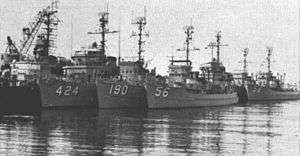USS Falcon (AMS-190)
 Falcon with U.S. Mine Division 22, circa 1965 | |
| History | |
|---|---|
| Name: | USS Falcon |
| Builder: | Quincy Adams Yacht Yard |
| Launched: | 21 September 1953 |
| Commissioned: | 24 November 1954 |
| Decommissioned: | 1 May 1976 |
| Reclassified: | MSC-190, 7 February 1955 |
| General characteristics | |
| Class and type: | Bluebird-class minesweeper |
| Displacement: | 290 long tons (295 t) |
| Length: | 144 ft (44 m) |
| Beam: | 28 ft (8.5 m) |
| Draft: | 9 ft (2.7 m) |
| Speed: | 13 knots (24 km/h; 15 mph) |
| Complement: | 39 |
| Armament: | • 2 × 20 mm mounts |
The fourth USS Falcon (AMS-190/MSC-190) was a Bluebird-class minesweeper in the United States Navy.
Falcon was launched 21 September 1953 by Quincy Adams Yacht Yard, Inc., Quincy, Massachusetts; sponsored by Mrs. A. D. MacDonnell; and commissioned 24 November 1954, Lieutenant (junior grade) M. J. Schultz, Jr., in command. She was reclassified MSC-190 on 7 February 1955.
East Coast operations
Between 7 January 1955 and 16 January 1957, Falcon was based at Charleston, South Carolina, for minesweeping exercises, amphibious operations, and mine warfare development activities along the east coast and in the Caribbean. Little Creek, the amphibious base in the Norfolk, Virginia, naval complex, was her home port for similar operations until 12 February 1959, when she sailed for Rodman, Canal Zone. During 1960, she sailed out of Rodman for operations on both sides of the Panama Canal, and visits to Central American islands and ports.
References
- This article incorporates text from the public domain Dictionary of American Naval Fighting Ships. The entry can be found here.